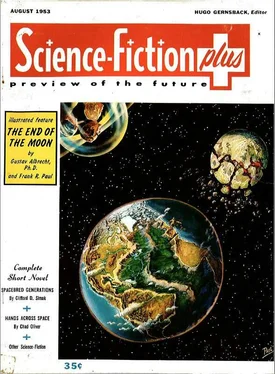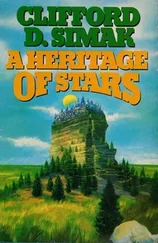"We've been friends for years," said Joe. "You got something on your mind . . ."
Jon, looking down at him, tried to see the boy, but the boy was gone. Instead was the man who sat beneath the Picture, the man who read the Ending, the pious man, the good man, a leader of the Ship's community.
He shook his head. "I'm sorry, Joe."
"I only want to help."
But if he knew, thought Jon, he wouldn't want to help. He'd look at me in horror, he'd report me to the chapel, he'd be the first to cry heresy. For it was heresy, there was no doubt of that. It was a denial of the Myth, it was a ripping away of the security of ignorance, it was a refutation of the belief that all would be for the best, it was saying they could no longer sit with folded hands and rely upon the planned order of the Ship.
"Let's play a game," he said with resolve.
"That's the way you want it, Jon?" demanded Joe. "That's the way I want it."
"Your move," said Joe.
Jon moved his queen pawn. Joe stared at him.
"You play a king's pawn game."
"I changed my mind," said Jon. "I think this opening's better."
"As you wish," said Joe. They played. Joe won without any trouble.
At last, after days of lying on the bed and wearing the cap, of being lullabyed to sleep and waking with new knowledge, he knew the entire story.
He knew about the Earth and how Earthmen had built the ship and sent it out to reach the stars and he understood a little about the reaching for the stars that had driven humans to plan the ship.
He knew about the selection and the training of the crew and the careful screening that had gone into the picking of the ancestors of the colonists-to-be, the biological recommendations which had determined their mating so that when the fortieth generation should finally reach the stars they would be a hardy race, efficient to deal with the problems there.
He knew about the educational setup and the books that had been intended to keep knowledge intact and he had some slight acquaintance with the psychology involved in the entire project.
But something had gone wrong.
Not with the ship, but with the people in it. The books had been fed into the converter.
The Myth had risen and Earth had been entirely forgotten.
The knowledge had been lost and legend had been substituted.
In the span of forty generations the plan had been lost and the purpose been forgotten and the Folk lived out their lives in the sure and sane belief that they were self-contained, that the Ship was the beginning and the end, that by some divine intervention the Ship and the people in it had come into being and that their ordered lives were directed by a worked-out plan in which everything that happened must be for the best.
They played at chess and cards and listened to old music, never questioning for a moment who had invented cards or chess or who had created music. They whiled away not hours, but lives, with long gossiping and told old stories and swapped old yarns out of other generations. But they had no history and they did not wonder and they did not look ahead —for everything that happened would be for the best. [2] The importance of written records as opposed to memory insofar as accuracy is desirable was pointed out many years ago by Sir George Cornewall Lewis, the British historian, who made an exhaustive study of the credibility of early Roman history. As a result of this study, Lewis arrived at the conclusion that a tradition of a past event is not transmitted orally from generation to generation with anything like accuracy of detail for more than a century, and in most instances for a considerably lesser period. Therefore, on a thousand-year flight, if written records were not kept, it is extremely likely that Earth would be forgotten or, at best, would exist only as a legend. A thousand years, in this day of multi-billion financing, seems a small number and is easy to say or write, but is terribly long in actual time. The time since the invasion of England by William the Conqueror is not yet a thousand years. America was discovered by the Vikings not quite a thousand years ago, by Columbus less than half a thousand years ago. If records had not been kept of the Columbus voyage or of the Norman invasion, they would now be forgotten incidents and subject to the speculation of historian theorists. As it is, the Viking voyages to America are very imperfectly known, since only fragments of their record exist, written down many years after the event, from the sagas which commemorated them.—The Author.

For year on empty year the Ship was all they had known. Even before the first generation had died the Earth had become a misty thing far behind, not only in time and space, but in memory as well. There was no loyalty to Earth to keep alive the memory of the Earth. There was no loyalty to the Ship, because the Ship had no need of it.
The Ship was a mother to them and they nestled in it. The Ship fed them and sheltered them and kept them safe from harm.
There was no place to go. Nothing to do. Nothing. to think about. And they adapted.
Babies, Jon Hoff thought.
Babies cuddling in a mother's arms. Babies prattling old storied rhymes on the nursery floor.
And some of the rhymes were truer than they knew.
It had been spoken that when the Mutter came and the stars stood still the End was near at hand.
And that was true enough, for the stars had moved because the ship was spinning on its longitudinal axis to afford artificial gravity.
But when the ship neared the destination, it would automatically halt the spin and resume its normal flight, with things called gyroscopes taking over to provide the gravity.
Even now the ship was plunging down toward the star and the solar system at which it had been aimed. Plunging down upon it if—and Jon Hoff sweated as he thought of it—if it had not already overshot its mark.
For the people might have changed, but the ship did not. The ship did not adapt. The ship remembered when its passengers forgot. True to the taped instructions that had been fed into it more than a thousand years before, it had held its course, it had retained the purpose, it had kept its rendezvous and even now it neared its destination.
Automatic, but not entirely automatic. [3] Throughout the story I have emphasized that the spaceship concerned operated automatically. In view of the rapid strides which are being made in this direction at the moment, it does not seem to me that such a development is unreasonable. Automatic pilots hate been used on planes for several years to hold the plane on course. In March, 1953, the Minneapolis-Honeywell Regulator company of Minneapolis, Minn., announced the development of an electrical "brain" which would take a plane off the ground, fly it on a prescribed course to its destination and then land it—without a human hand touching the controls. The "brain" has been delivered to the air force at Wright Field , Ohio, and will be given flight tests sometime this year in a B-50 bomber. The flight of the plane is controlled by a tape upon which a flight plan is punched by means of a special coding device, the tape being fed into the brain. The "brain" thus "memorizes" the flight plan from the tape and converts information from a myriad of instruments, scissors, computers, and other navigational aids into electrical impulses that go to the plane's machinery to carry out the plan .—The Author.
It could not establish an orbit around the target planet without the help of a human brain, without a human hand to tell it what to do. For a thousand years it might get along without its human, but in the final moment it would need him to complete its purpose.
Читать дальше











